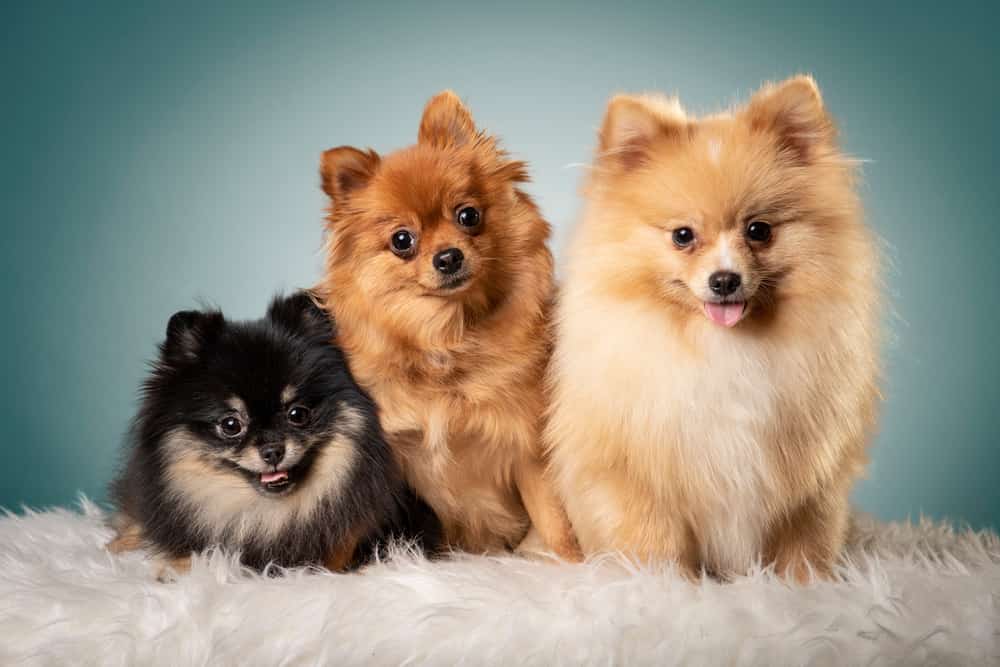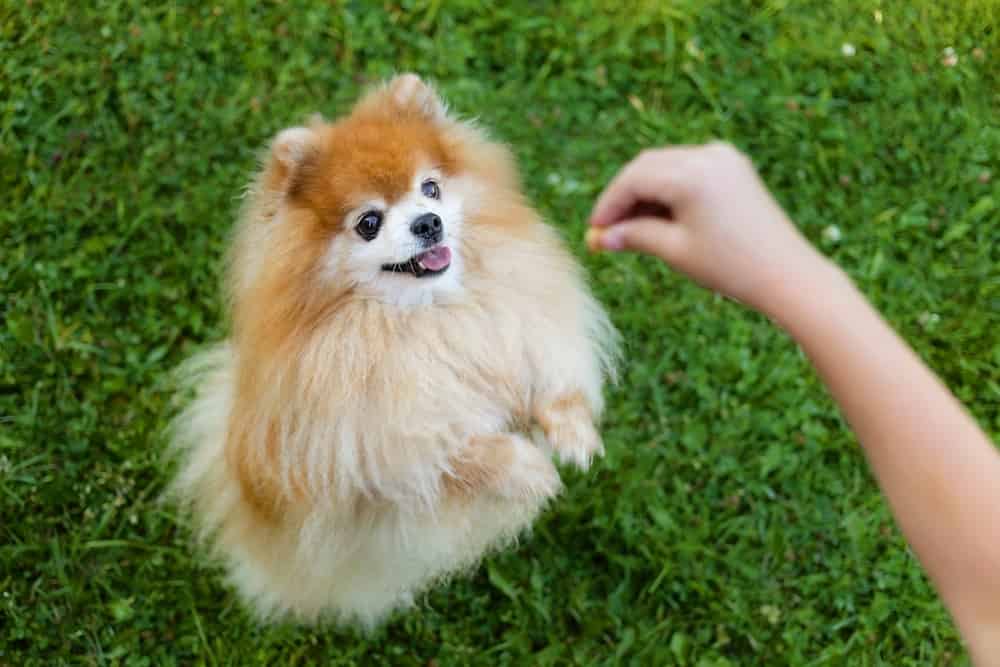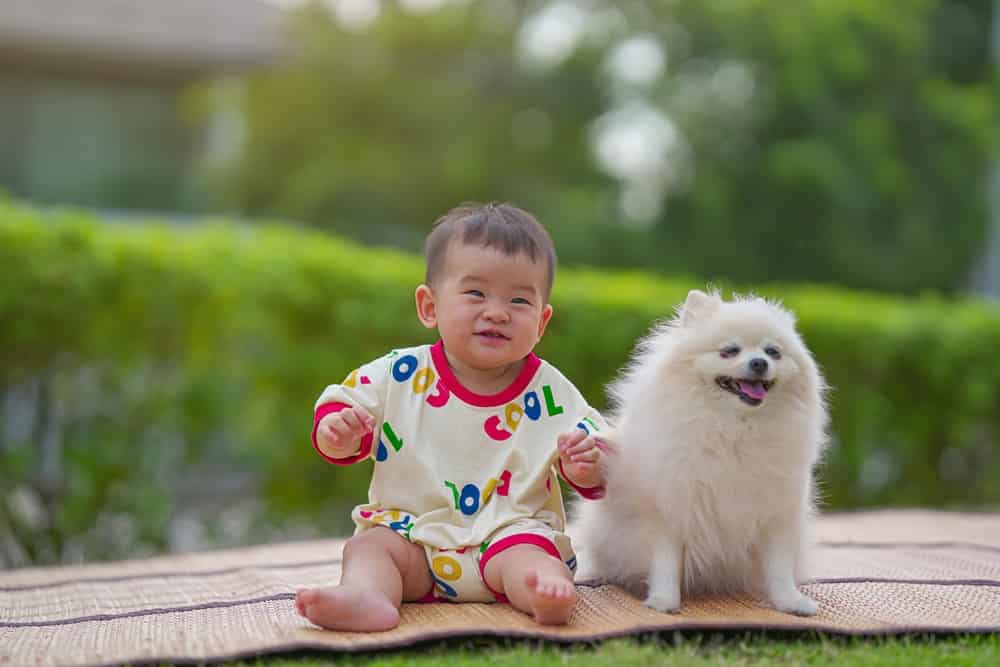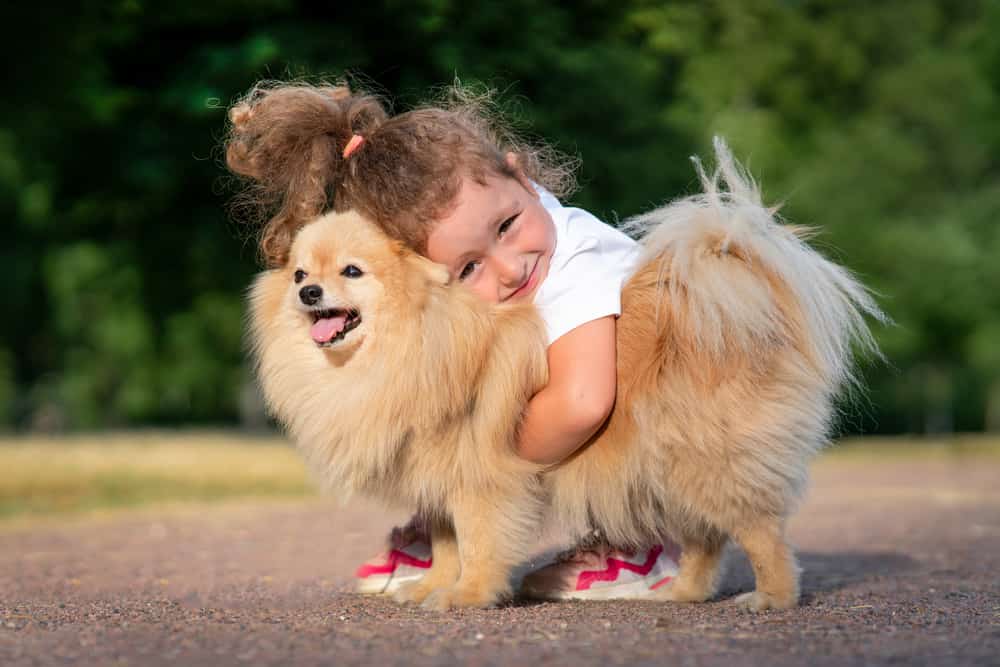When parents are ready to add a dog to the family, it is a good time to start researching the best dog breeds for kids. Some dog breeds are excellent guard dogs, and others are great playmates, so finding the right dog breed for your family is the important first step before bringing home a family dog.
Small toy dogs like Pomeranians seem like a natural fit for kids. They are small and fluffy and resemble stuffed animals. While this breed is generally friendly and playful, they can be aggressive if they have yet to be trained.
What Are Pomeranians?

©Eva Sustar/Shutterstock.com
Pomeranians are small dogs with big personalities. They were originally much larger at 20-30 pounds and were descended from the spitz family of dogs in the Nordic region. Spitz dogs were much larger than the modern Pomeranian, and their primary job was herding and guarding. Throughout the years, they were bred to be much smaller at the request of Queen Victoria, who had a love for small dogs. She helped make the breed popular during that time.
Pomeranians have a unique look with the face of a fox and a double layer of fluffy fur. Their coloring is most commonly an orangish red, but they can come in a dozen different colors. Pomeranians have fluffy plumed tales and usually weigh between 3 and 7 pounds. Their pointy triangle ears give them a look that they are perpetually asking a question.
Key Characteristics of Pomeranians
- Friendly
- Energetic
- Playful
- Curious
- Feisty
- Suspicious
- Alert
Are Pomeranians Good Family Dogs?

©Maliutina Anna/Shutterstock.com
Pomeranians make good family dogs but are not good for small young children. Young children may treat them like toys, pick them up and drop them or play too aggressively with them. Pomeranians look like little toys, and it's easy to want to hold them and play with them. Aggressive play, though, can lead to injuries for the fragile little pups. In some cases, Pomeranians can also become aggressive toward small children who are loud with erratic and impulsive movements. Young children may pull the dog's tail or accidentally step on them. These dogs will get defensive and be aggressive toward small children.
Pomeranians make good family dogs for children old enough to understand their fragility and treat them kindly. They are loyal dogs that love to play, and despite their small size, they will act as guard dogs alerting to intruders or other threats. Pomeranians are known to bite and nip when they are under stress or feel threatened.
While these small dogs are quite affectionate with their family, they can be wary of new people, especially children. So, if the dog is accustomed to the children in their household, but new children come to the home, the dog may react negatively toward the new children. Children should always be supervised for safety.
If any family member in the home suffers from allergies, a Pomeranian could make allergies worse. They shed a lot and are not considered a hypoallergenic dog breed.
Temperament and Maintenance
Pomeranians have perky personalities, and they love to cuddle and play. They are easy to train because they are such intelligent dogs, and they're eager to have boundaries and rules to follow. They are generally healthy dogs that don't suffer from any unusual health issues. However, they are prone to injury from jumping off couches and beds or even jumping out of their loved ones' arms.
Pomeranians are small lapdogs that enjoy being close to their owners. Like all dogs, they need some exercise, but caring for a Pomeranian only requires a little space, making them good dogs for apartment living. They are fine with short walks and indoor play. When they spend time outside, it is important to be by their side, especially if you live in an area with natural predators. The small size of the dogs makes them susceptible to predatory birds like owls and hawks or bigger, more aggressive dogs.
Pomeranians have two coats of fur: a soft inner coat and a puffy outer coat. They benefit from regular brushings, especially during shedding season. Brushing often helps keep their coat from matting. The American Kennel Club recommends taking your Pomeranian to a groomer every four to six weeks for bathing, nail trimming, and ear cleaning. Pet parents should also clean their teeth weekly to keep them healthy.
Pomeranians do not need a special diet. However, they are prone to weight gain. Pet parents should opt for high-quality dry dog food for their Pomeranians. You should also discuss their diet and weight with the veterinarian if they start to gain too much. Extra weight on such a small dog can cause other health issues. Normal running around the home gives them exercise, but they also need to go outside for regular walks. Pomeranians are sensitive to extreme heat and cold and may resist outdoor walks in extreme temperatures.
Age and History

©Elena Yakimova/Shutterstock.com
Young Pomeranian pups tend to be very yappy and bark a lot. They are easily distracted and can have a quick temper. As they age, they become less assertive and calmer. Despite their small stature, Pomeranians will bark and fight with dogs that are much bigger than they are. They are feisty little spitfires that stand up to any perceived threat to protect themselves or their families. They are part guard dogs and part playmates for the children in their homes.
With their pleasant personalities, Pomeranians have been used as therapy dogs and emotional support animals. Newsweek has added Pomeranians to their list of breeds that make excellent therapy dogs. PetsRadar explains that Pomeranians also make great service dogs for the deaf and hard of hearing. These adorable toy-sized dogs have it all, brains and beauty.
Preparing Your Pomeranian for a Baby

©Atichat Wattanasin Stone/Shutterstock.com
If you already have a Pomeranian at home and are expecting a baby, you will need to prepare the dog for the new arrival as soon as possible. Pomeranians can be trained, and training them with basic commands such as sit, stay, and heel is just the beginning.
Before the baby arrives, you can prepare the dog by playing recordings of baby sounds or having baby items and smells like powder around, so they adjust to the idea of a baby. Pomeranians are small and may be jealous of the new addition. Make sure to gradually introduce smells, sounds, and objects associated with the baby to the dog early. Then, when the baby does come, bring home the baby's blanket or other small items so the dog can smell the baby's scent.
One key to making the transition easier is to keep your Pomeranian's routine. Feed them at the same time and in the same place in the home. And make sure they still get outside for daily walks at the same time. Because this breed is so intelligent, you need to avoid having them associate disruptive changes in their routine with the new family member. And, of course, never leave a baby or toddler unsupervised with a Pomeranian. While the dog is small, it can still harm a small infant that they see as a threat.
Are Pomeranians Good with Kids?
The answer is that it depends. While they are smart and easy to train, they do better with older children that can handle their tiny bodies with care. Pomeranians are sweet and loving lapdogs that adore playing and cuddling.
Pros of Pomeranians as a Family Dog
- Friendly
- Small
- Not overpowering
- Intelligent and easy to train
- Don't need much space or exercise
Cons of Pomeranians as a Family Dog
- Aggressive
- Defensive
- Easily agitated
- Nips and bites when startled
- Barking and yapping
Overall, Pomeranians are good with kids and make good family dogs. The key is to train them from a young age and supervise them around young children. It's important to teach any child that will be around them to be calm and gentle with these toy-like dogs. Older children in the family will have an easier time bonding with Pomeranians, and they will form a loving, affectionate bond with this small dog with a large bite.
The image featured at the top of this post is ©EugeneEdge/Shutterstock.com.

